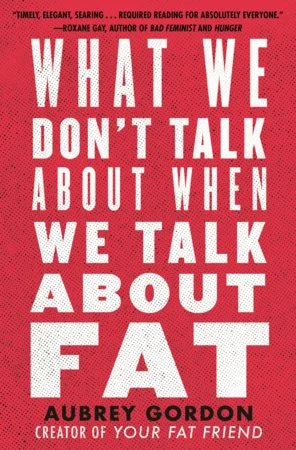Let’s Talk About Fat: A Review of What We Don’t Talk About When We Talk About Fat by Aubrey Gordon
By Veronica Salib, written August 2022
Today, calling someone fat is an insult rather than just a description of their body. Fat is a word we shy away from, a word we hate being described as, a word we whisper. Not for Aubrey Gordon. Aubrey Gordon yells about fat. She doesn’t avert her eyes and ears at the mention of fatness and doesn’t sugarcoat the experiences that come with being fat. In her book, What We Don’t Talk About When We Talk About Fat, Aubrey talks about exactly that. The hidden parts of being fat. The parts that thin people or ‘not fat’ people have trouble comprehending.
In our current society, thin is the desired aesthetic. Everywhere you turn there are ads tailored for weight loss, a slimmer waist, and a smaller body. Influencers market products to make you lose weight fast. Weight loss is applauded. A thinner body regardless of whether or not it’s a healthy body is deemed desirable.
Aubrey is a self-proclaimed and unashamed fat person who started her literary career with her essay series called Your Fat Friend. According to her website, “she published exclusively under the pseudonym [Your Fat Friend] for four years, writing anonymously about the social and cultural realities of moving through the world as a very fat person.”
In What We Don’t Talk About, Aubrey weaves anecdotes about being a fat person into discussions about how institutions discriminate against fat people. The anecdotes, both her own and others, display the truly grotesque ways in which fat people are treated. Each chapter of the book covers a new aspect of fatness. The first starts with a description and anecdote of life as a fat person trying to travel. Aubrey shares stories on the plights of traveling as a fat person and goes on to explain the systemic discrimination against fat people.
Openly mocked, judged, bullied, and disregarded, fat people are often met with a lack of empathy that Aubrey highlights in her book. In addition to describing the discrimination, later chapters of the book explore further themes such as public health rhetoric around fatness, diet culture, the common commentary on what fat people eat or look like, concerns of fat people on desirability, and medical bias against fat people.
Aubrey’s book highlights the difficulties of being a fat person. She describes inequities and discrimination in all aspects of life from traveling to healthcare. Despite all the negativity Aubrey concludes her book on a hopeful note. At the start of her last chapter, she says, “There is a world beyond this one. In that world, diversity in size and shape are understood to be part of the natural variance of human bodies, from very fat people to very thin ones. So, too are fluctuations in weight.” She goes on to outline ways in which our society can move away from its fatphobic ways. Her recommendations include plans to criminalize discrimination based on weight, improved access to healthcare and public spaces, awareness of and cessation of fat violence against kids and adults, and the banning of dangerous weight loss drugs.
As I am on my own journey of loving and accepting the body I live in, Aubrey’s words deeply resonated with me. While my body is not very fat and I will never fully understand the struggles that very fat people deal with, I do not have a thin body.
Aubrey’s words have empowered me to accept my body the way it is. Her words and stories have validated the feelings I have living in a size 14 body while society says anything above a size 4 is unattractive. It taught me that I don’t have to live in one of two extremes. I don’t have to starve myself until I am a size 4. On the flipside, I don’t have to fake complete happiness. My body can just be a body, not a measure of my worth.
While this book may have filled me with unbridled rage at the never-ending negative experiences based on size, it also provided me with a light at the end of the tunnel. Despite society’s lack of love for bodies like mine, there are people working tirelessly to make space for them, and make sure it is well cared for and accepted. With activists like Aubrey, there will come a day in which fat is just a word. There will come a day where I no longer resent the body I was given, where I am unwavering in my love for the body that I live in. there will come a day where my body is just a vessel for my being rather than a visual representation of my worth.
Veronica Salib was the summer 2022 publications intern at Yellow Arrow Publishing. She works as an assistant editor for a healthcare media company. Veronica graduated from the University of Maryland in 2021 and hopes to return to school and obtain a master’s in publishing.
*****
Yellow Arrow recently revamped and restructured its Yellow Arrow Journal subscription plan to include two levels. Do you think you are an Avid Reader or a Literary Lover? Find out more about the discounts and goodies involved at yellowarrowpublishing.com/store/yellow-arrow-journal-subscription. Yellow Arrow Publishing is a nonprofit supporting women writers through publication and access to the literary arts.
You can support us as we AWAKEN in a variety of ways: purchase one of our publications from the Yellow Arrow bookstore, join our newsletter, follow us on Facebook, Instagram, or Twitter or subscribe to our YouTube channel. Donations are appreciated via PayPal (staff@yellowarrowpublishing.com), Venmo (@yellowarrowpublishing), or US mail (PO Box 102, Glen Arm, MD 21057). More than anything, messages of support through any one of our channels are greatly appreciated.
